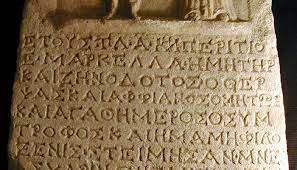Ancient Greek Club: A Q&A With Dr. Tugendhaft

The Ancient Greek Club is a new club that Dr. Tugendhaft started this year. The Rampage interviewed Dr. Tugendhaft about the background and successes of this club.
David Gitelman: What inspired you to start the Ancient Greek Club?
Dr. Aaron Tugendhaft: Some juniors approached me a few weeks back asking if I could teach Ancient Greek, but I didn’t feel well-equipped enough for a class. I’ve had it in mind to make a club for a while, and so I recently reached out to a friend and colleague who knows the language and we started the club.
DG: Where do you see this club going? Do you think it could be offered as a real course someday?
AT: I do hope to make it into a real class option for students, although it remains to be seen how feasible that would be. Perhaps we can make it an option for seniors next year and then eventually make it into a full program that would start in the earlier grades. I think learning Ancient Greek has a particular value, especially to students who enjoy the humanities. I want kids who love history, philosophy, or linguistics in Ramaz to have advanced courses. We should create paths for them to learn high-level material in these subjects, similar to how mathematically-inclined kids have an ability to take calculus. Greek is a traditional tried and true language that there seems to be a lot of student interest in. There are so many domains of learning in which knowledge of Ancient Greek would be beneficial. This even includes the realm of Judaic Studies, where there is a long tradition dating to antiquity of conversation between Greek and Jewish culture, not always the most positive. Ancient Greek literacy opens up a way to think about this dialogue in relation to what they learn in the Hebrew and Aramaic of the Talmud. I think that could be a very enriching experience.
DG: Have you thought about offering clubs or classes for other ancient languages, such as Latin, Sumerian, or Akkadian?
AT: It would be difficult because there isn’t much room for more classes with the dual curriculum. However, I believe precisely because we spend so much time studying ancient texts in our Judaic classes, we are particularly well suited to expand that and connect that with a more rigorous study of other elements of antiquity. I think that Greek is a very good place to start. Latin might be a traditionally more conventional language to learn, but in Ramaz learning Ancient Greek makes more sense due to the unique relationship between Jewish and Greek thought and culture. If an Ancient Greek class became popular, and if scheduling permitted, I’d love to see the language-learning initiative expanded and offer whatever other languages I could. One thing I can say is that Akkadian is difficult, but it is a semitic language so there is a connection to Hebrew, which students already have a basic knowledge of. Find me a college that would not be impressed by seeing Akkadian on a high school transcript! Less ambitiously, I’d like to teach Ugaritic, the language of the ancient city of Ugar. I wrote my dissertation on Ugar and Ugaritic, and it’s closer to Hebrew than the other aforementioned languages. There was a minicourse on Ugaritic culture and language for seniors in their final minicourse block. We learned a bit of the language since it is related to Hebrew. Again, learning all of these languages would be immensely beneficial in that it could open up the ability to read ancient text rather than just read what others about the subject from a textbook.
DG: What value do you think there is in learning a dead language like Ancient Greek?
AT: First of all, learning a dead language with a well-defined grammar like Ancient Greek is intellectually a great exercise for understanding language, grammar, and challenging oneself intellectually. It is challenging and difficult, not unlike advanced math, which you may never use, but which exercises your brain. I believe the intellectual effort for its own sake is worthwhile. Once you understand an ancient language it also connects you to a fascinating world of ancient thought and culture. It makes you realize how much richer it is to study foreign cultures in their own languages, since there is an element that is lost by just learning it in English. The wisdom of the ancient Greeks is best read in the original text and there is a certain something lost in the translation that you can’t get unless you learn the language. Lastly, you’re engaged in an activity that for over two millennia has been a defining point of what it means to be a well-educated person. Learning an ancient, seemingly “useless” language like Ancient Greek actually strengthens the mind, empowers a person educationally, and links them in a long line of rich intellectual tradition.


